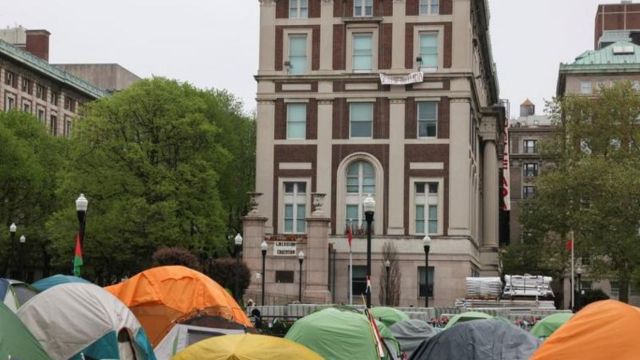The 36 new special patrol officers that Columbia University announced last month were hired by the New York Police Department. They will be under the direction of the police commissioner, which was confirmed this week by a Columbia spokesperson.
Last year, Columbia’s leaders asked the city’s police commissioner to hire and swear in the officers. This was after they had called the NYPD twice to arrest pro-Palestinian student protests.
The participation of the NYPD had not been made public by Columbia before. In answer to questions from Reuters that were sent in August of last year, Samantha Slater, a spokesperson for Columbia, confirmed the NYPD’s role.
Columbia University was the center of a pro-Palestinian student protest movement last spring. This movement has caused trouble on campuses around the world and has been criticized by Democrats, Republicans, donors, and some students and teachers.
The University Senate, which is made up of 111 students, staff, and graduates, and Columbia’s board of trustees have often had different ideas about how to handle the protests.
The Senate, which makes rules and shares control of the university with the trustees, said that the trustees and president’s office had not told them that the NYPD was involved in any way. The university’s charter says that the president must talk to the University Senate before calling the police to stop protests that are getting in the way.
Claire Shipman, who is a co-chair of the board of trustees, was named acting president of the university last week.
In a first for the Ivy League school, Columbia’s new police officers can search and arrest people without an order, just like any other police officer in New York. Laws in the state allow police to use “physical force and deadly physical force in making an arrest or preventing an escape.”
“They won’t have weapons,” Slater said. A NYPD spokesperson also said that the patrol cops would not be carrying guns, but they wouldn’t answer any other questions. After 162 hours of training, the new officers will be able to police Columbia’s privately owned buildings, gated plazas, and lawns, which is something that most NYPD officers can’t do.
They will hold and process people who they arrest in an office on a campus about 20 blocks uptown from the main campus until they can be turned over to the local NYPD station. To follow the rules, training, and orders of the police commissioner, Columbia will pay the officers. They also “possess all the powers and discharge all the duties” of regular NYPD patrol officers, which is what the city’s administrative code says.
Unlike Columbia’s 117 civilian safety staff, Slater said, the officers will be able to “remove individuals from campus, issue citations and make arrests, if necessary and appropriate.” They will work with the university’s public safety team.
Other colleges, like Cornell and the City University of New York, have their own plans for police officers who can arrest people under the state’s peace officers law. These plans do not involve the NYPD.
The plan was going months before U.S. President Donald Trump returned to the White House. His government said last month that Columbia had to tighten its protest rules or lose all federal funding forever because of what it called antisemitic harassment on and near campus. One of the nine requests was that the school hire police officers who could arrest people.
Columbia’s Office of Public Safety changed its website this week to say that the new officers will help the school “respond more effectively and promptly to campus disruptions while reducing our reliance on the NYPD.”
Not that it said the new police officers are chosen by and must follow the commissioner of the NYPD.
In interviews, Dr. Jeanine D’Armiento, a medicine professor and chair of the Senate’s executive committee, and two other senators who did not want to be named said that the president’s office would not tell them who in the New York government was giving the officers permission.
Columbia spokesperson Slater refused to say why the president’s office had not told students and employees, including the Senate, of the NYPD’s involvement. She said that the university was following all of its rules.
The Senate was created after the president of Columbia University called the police to end protests against the Vietnam War in 1968. The protests included taking over a Columbia building, and the NYPD used tear gas, which hurt more than 100 students and staff.
After many years, the police were called again last year, even though the Senate was against it. The president’s office sent hundreds of armed officers to campus twice to arrest student marchers on misdemeanor trespass charges, and some of them were hurt. Almost always, the charges were dropped.









